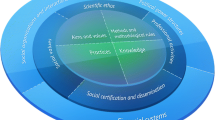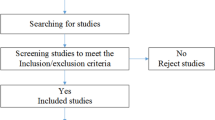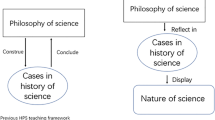Abstract
This study sought to establish whether teachers' views about the nature of science and scientific inquiry are reflected in their choice and design of learning experiences and, therefore, are significant influences on children's understanding of science. Even those teachers who hold clear and coherent views about science do not plan laboratory-based activities consistently in relation to those views, concentrating instead on the immediate concerns of classroom management and on concept acquisition and development.
Similar content being viewed by others
References
Aguirre, J. M., Haggerty, S. M., & Linder, C. J. (1990). Student teacher's conceptions of science, teaching and learning: A case study in preservice science education.International Journal of Science Education,12(4), 381–390.
Aikenhead, G. S., Fleming, R. W., & Ryan, A. G. (1987). High school graduates' beliefs about science-technology-society. I. Methods and issues in monitoring student views.Science Education,71(2), 145–161.
Aikenhead, G. S., & Ryan, A. G. (1989).The development of a multiple-choice instrument for monitoring views on science-technology-society topics. Ottawa: Social Sciences and Humanities Research Council of Canada.
Aikenhead, G. S., Ryan, A. G., & Fleming, R. W. (1989).Views on science-technology-society. Saskatoon: University of Saskatchewan.
Benson, A. (1986).Children's understanding of science in four comprehensive schools. Unpublished M.Ed. Thesis, University of Manchester.
Benson, G. D. (1989). Epistemology and science curriculum.Journal of Curriculum Studies,21(4), 329–344.
Benson, G. D. & Jacknicke, K. G. (1988). Students' conceptions of biology.Qualitative Studies in Education,1(4), 329–342.
Brickhouse, N. W. (1989). The teaching of the philosophy of science in secondary classrooms: Case studies of teachers' personal theories.International Journal of Science Education,11(4), 437–449.
Brickhouse, N. W. (1990). Teachers' beliefs about the nature of science and their relationship to classroom practice.Journal of Teacher Education,41(3), 53–62.
Burns, J. C., Okey, J. R., & Wise, K. C. (1985). Development of an integrated process skills test: TIPS II.Journal of Research in Science Teaching,22(2), 169–177.
Carey, S., Evans, R., Honda, M., Jay, E., & Unger, C. (1989). An experiment is when you try it and see if it works: A case study of grade 7 students' understanding of the construction of scientific knowledge.International Journal of Science Education,11(4), 514–529.
Chambers, D. W. (1983). Stereotypic images of the scientist: The Draw-a-Scientist Test.Science Education,67(2), 255–265.
Cheung, K. C., & Taylor, R. (1991). Towards a humanistic constructivist model of science learning: Changing perspectives and research implications.Journal of Curriculum Studies,23(1), 21–40.
Claxton, G. (1990).Teaching to learn. London: Cassell.
Cooley, W. W., & Klopfer, L. E. (1961).Manual for the test on understanding science. Princeton, NJ: Educational Testing Service.
Coxhead, P., & Whitfield, R. C. (1975).Science understanding measure: Test manual. Birmingham: University of Aston.
Dibbs, D. R. (1982).An Investigation into the nature and consequences of teachers' implicit philosophies of science. Unpublished Ph.D. Thesis, University of Aston.
Dillashaw, F. G., & Okey, J. R. (1980). Test of integrated process skills for secondary school science students.Science Education,64(5), 601–608.
Driver, R. (1975). The name of the game.School Science Review,56(197), 800–805.
Duschl, R. A. (1983). Science teachers' beliefs about the nature of science and the selection, implementation and development of instructional tasks: A case study.Dissertation Abstracts International,45(2), 422-A.
Duschl, R. A., & Gitomer, D. H. (1991). Epistemological perspectives on conceptual change: Implications for educational practice.Journal of Research in Science Teaching,28(9), 839–858.
Gallagher, J. J. (1991). Prospective and practicing secondary school science teachers' knowledge and beliefs about the philosophy of science.Science Education,75(1), 121–133.
Hodson, D. (1988). Experiments in science and science teaching.Educational Philosophy & Theory,20(2), 53–66.
Hodson, D. (1992). Redefining and reorienting practical work in school science.School Science Review,73(264), 65–78.
Kimball, M. E. (1967). Understanding the nature of science: a comparison of scientists and science teachers.Journal of Research in Science Teaching,5(2), 110–120.
King, B. B. (1991). Beginning teachers' knowledge of and attitudes toward history and philosophy of science.Science Education,75(1), 135–141.
Koulaides, V., & Ogborn, J. (1988). Use of systematic networks in the development of a questionnaire.International Journal of Science Education,10(3), 497–509.
Koulaides, V., & Ogborn, J. (1989). Philosophy of science: An empirical study of teachers' views.International Journal of Science Education,11(2), 173–184.
Lantz, O., & Kass, H. (1987). Chemistry teachers' functional paradigms.Science Education,71(1), 117–134.
Larochelle, M., & Desautels, J. (1991a). Of course, it[s just obvious: Adolescents' ideas of scientific knowledge.International Journal of Science Education,13(4), 373–389.
Larochelle, M., & Desautels, J. (1991b).The epistemological turn in science education: The return of the actor. Paper presented at the International Workshop: Research in Physics Learning. Theoretical Issues and Empirical Studies, Institute of Physics Education, University of Bremen.
Lederman, N. G. (1986). Relating teaching behavior and classroom climate to changes in students' conceptions of the nature of science.Science Education,70(1), 3–19.
Lederman, N. G., & O'Malley, M. (1990). Students' perceptions of tentativeness in science: development, use and sources of change.Science Education,74(2), 225–239.
Lederman, N. G., & Zeidler, D. L. (1987). Science teachers' conceptions of the nature of science: Do they really influence teaching behavior?Science Education,71(5), 721–734.
Mayer, V. J., & Richmond, J. M. (1982). An overview of assessment instruments in science.Science Education,66(1), 49–66.
Rowell, J. A., & Cawthron, E. R. (1982). Images of science: An empirical study.European Journal of Science Education,4(1), 79–94.
Rubba, P. A. & Anderson, H. O. (1978). Development of an instrument to assess secondary school students' understanding of the nature of scientific knowledge.Science Education,62(4), 449–458.
Russell, T., & Munby, H. (1989). Science as a discipline, science as seen by students and teachers' professional knowledge. In R. Millar (Ed.),Doing science: Images of science in science education. Lewes: Falmer Press.
Songer, N. B., & Linn, M. C. (1991). How do students' views of science influence knowledge integration?Journal of Research in Science Teaching,28(9), 761–784.
Wolfe, L. F. (1989). Analyzing science lessons: A case study with gifted children.Science Education,73(1), 87–100.
Welch, W. W. (1969a).Science process inventory. Minneapolis: University of Minnesota.
Welch, W. W. (1969b).Wisconsin inventory of science processes. Madison: University of Wisconsin Scientific Literacy Research Center.
Wellington, J. J. (1981). What's supposed to happen, Sir?School Science Review,63, 167–173.
Zeidler, D. L., & Lederman, N. G. (1987).The effect of teachers' language on students' conceptions of the nature of science. Paper presented at the National Association for Research in Science Teaching Annual Meeting, Washington, DC.
Author information
Authors and Affiliations
Rights and permissions
About this article
Cite this article
Hodson, D. Philosophic stance of secondary school science teachers, curriculum experiences, and children's understanding of science: Some preliminary findings. Interchange 24, 41–52 (1993). https://doi.org/10.1007/BF01447339
Issue Date:
DOI: https://doi.org/10.1007/BF01447339




